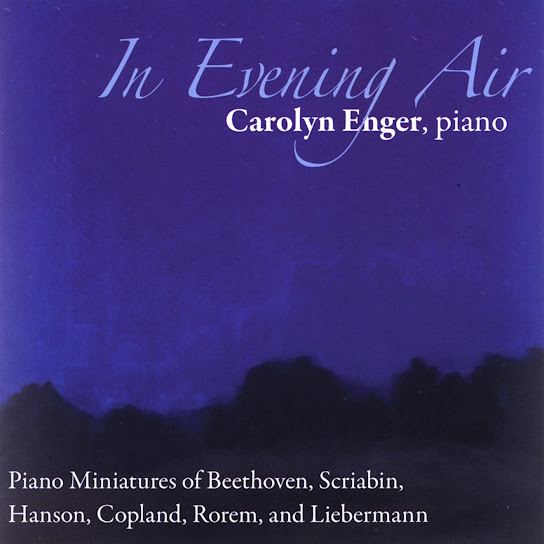Pianist Carolyn Enger performs a program of piano miniatures by Ludwig van Beethoven, Alexander Scriabin, Howard Hanson, Aaron Copland, Ned Rorem, and Lowell Liebermann.
The Art of the Bagatelle The genre of the piano miniature is one of the most personal in the classical repertoire. For composers, these pieces are usually un-commissioned-written between larger projects solely from irrepressible musical desire.
For a pianist, these personal statements provide exquisite challenges and represent a composer’s technique at it’s most “naked.” In several pages (or sometimes only several phrases), a small world must be both created and explored.
For this recording, both familiar and unfamiliar works have been chosen. The pieces are presented in an interleaved manner, grouped so that the pieces inform each other across the decades.
Chronologically, the earliest pieces on the disc are Ludwig van Beethoven’s Six Bagatelles, op. 126, one of the composer’s final works for the piano. Beethoven commented to his publisher upon delivering the manuscript that he believed them to be “the best he had ever written.” By turns delicate, enigmatic, and turbulent, these brief character pieces encapsulate the spirit of Beethoven’s ground-breaking late compositions.
Alexander Scriabin produced a large number of pieces for the piano. Though quite different in scope from his famous sonatas, Scriabin’s passionate preludes vary in character-from the icy Russian landscape of op. 51, no. 2, to the sunny and radiant colors of op. 11, no. 13.
Howard Hanson was one of the most distinguished American musical figures of the 20th century through his work as composer, conductor, and president of the Eastman School of Music. Though a brilliant pianist himself, Three Miniatures are Hanson’s only solo piano compositions in his mature musical style. The rich harmonies and characteristic voicings employed in his beloved orchestral idiom are heard on every page.
Though Aaron Copland produced three career-spanning major works for solo piano (variations, sonata, and fantasy), in his later years he created a few small piano pieces based on earlier sketches and fragments. Several of these pieces are represented here (Midsummer Nocturne, In Evening Air, and Midday Thoughts). Down a Country Lane was written in 1962, when Copland was at the height of his fame as “dean of American composers.” It was commissioned by Life Magazine and in a gesture that seems rather remarkable today, the sheet music was printed in the periodical! Sunday Afternoon Music was written in 1935 for an anthology of small pieces by famous American composers.
Throughout his career, Ned Rorem has written small keyboard pieces as gifts for friends. (Carolyn Enger has recorded an entire album of these pieces for future release.) In 2006, he completed a set of one-page pieces entitled Six Friends; each miniature is dedicated to a close friend or family member (including his sister Rosemary and his niece Mary). These pieces represent the spare, lyrical side of Rorem’s writing-stark and delicate.
In addition to his active compositional life, Lowell Liebermann is also an exceptional pianist. His Nocturne No. 1 is an early work, composed when he was 25. Liebermann has continued his series of nocturnes, intending eventually to write 21 (the same number as Chopin). As of 2009, he has written 10 of these pieces. Many of Liebermann’s works, including this nocturne, feature the developing of searching melodic material over a eerily textured backdrop.
—Carson P. Cooman
Released July 1, 2009
“Some discs are just needed. For quite a while I felt a need for an “evening disc” – calm and peaceful, to make me forget the troubles of a hard day. Something my wife would also like. And let it be the entire disc – without running to skip tracks, without sudden sharp edges, violent or jubilant outbursts. … The album “In Evening Air” by Carolyn Enger gave me exactly what I wished. It is a well selected, expressively played set of piano miniatures by composers from Beethoven to Rorem. From the first note it creates that intimate evening mood. … The playing of Carolyn Enger is thoughtful and sensitive. It is expressive, yet without external pressure: the expressivity comes from the music itself; the pianist only opens the doors to let it out. She plays with fine nuance and tone-shading.… This disc has already magically transformed a few of my evenings, and I am sure it can do the same for any lover of Romantic piano music. Absolute pleasure.”
—MusicWeb International
Tracks
- Prelude, Op. 11, No. 10 (1895)
- Midday Thoughts (1944/82)
- For Mary (2006)
- Bagatelle: Quasi Allegretto, Op. 126, No. 5 (1823 24)
- Reminiscence, Op. 12, No. 1 (1918 19)
- For Marian (2006)
- Nocturne No. 1, Op. 20 (1986)
- Prelude, Op. 51, No. 2 (1906)
- Down a Country Lane (1962)
- Prelude, Op. 11, No. 13 (1895)
- Bagatelle: Andante Con Moto, Op. 126, No. 1 (1823 24)
- For Rosemary (2006)
- Bagatelle: Andante, Op. 126, No. 3 (1823 24)
- Longing, Op. 12, No. 3 (1918 19)
- Midsummer Nocturne (1947)
- For Ben (1999)
- Bagatelle: Presto Andante Amabile E Con Moto Presto, Op. 126, No. 6 (1823 24)
- For Barbara (2006)
- In Evening Air (1966, Rev. 1972)
- Bagatelle: Allegro E Energico, Op. 126, No. 2 (1823 24)
- 75 Notes for Jerry (2007)
- Lullaby, Op. 12, No. 2 (1918 19)
- Sunday Afternoon Music (1935)
- For Don (2006)
- Prelude, Op. 11, No. 9 (1895)
